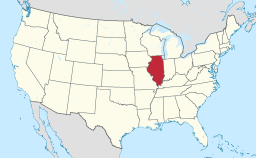Park Forest, Illinois
| Park Forest, Illinois | |
| Village | |
| Motto: "Live Grow Discover" | |
| Country | United States |
|---|---|
| State | Illinois |
| Counties | Cook, Will |
| Township | Rich Township (Cook) Monee Township (Will) |
| Elevation | 712 ft (217 m) |
| Coordinates | 41°29′31″N 87°40′26″W / 41.492°N 87.674°WCoordinates: 41°29′31″N 87°40′26″W / 41.492°N 87.674°W |
| Area | 4.96 sq mi (13 km2) |
| - land | 4.96 sq mi (13 km2) |
| - water | 0.00 sq mi (0 km2) |
| Population | 21,975 (2010) |
| Density | 4,430.4/sq mi (1,711/km2) |
| Village President | John Ostenburg |
| Timezone | CST (UTC−6) |
| - summer (DST) | CDT (UTC−5) |
| Postal code | 60466, 60467 |
| Area code | 708 |
|
Location in Cook County and the state of Illinois.
|
|
|
Location of Illinois in the United States
|
|
|
Website: www |
|
Park Forest is a village located south of Chicago in Cook and Will counties, Illinois, United States. As of the 2010 census, the village had a population of 21,975. Park Forest is bordered by Olympia Fields to the north, Chicago Heights to the east, University Park to the south (formerly Park Forest South), and Richton Park and Matteson to the west.
Developers Nathan Manilow, Carroll F. Sweet and Philip M. Klutznick held a press conference in the Palmer House in Chicago on October 28, 1946, to announce the planned development of a new self-governing community in Chicago's south suburbs. This project, soon to be referred to as Park Forest, was to be developed by American Community Builders (ACB). The village of Park Forest was designed by Elbert Peets in the tradition of planned communities around the nation to provide housing for veterans returning from World War II.
Studs Terkel, in his oral history of World War II, The Good War, says Park Forest and other such middle-class suburbs grew out of the new prosperity after the war. First he quotes an unnamed GI, "The war changed our whole idea of how we wanted to live when we came back. We set our sights pretty high. . . . I am now what you'd call middle class." Terkel goes on: "The suburb, until [about 1946], had been the exclusive domain of the 'upper class.' It was where the rich lived. The rest of us were neighborhood folk. At war's end, a new kind of suburb came into being. . . . Thanks to the GI bill, two new names were added to American folksay: Levittown and Park Forest.
...
Wikipedia


